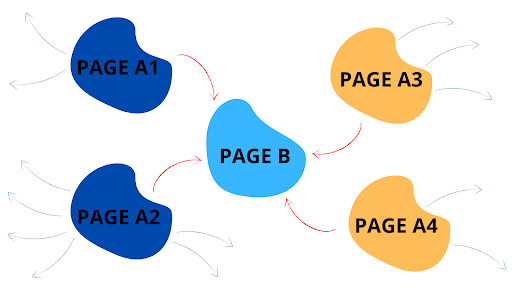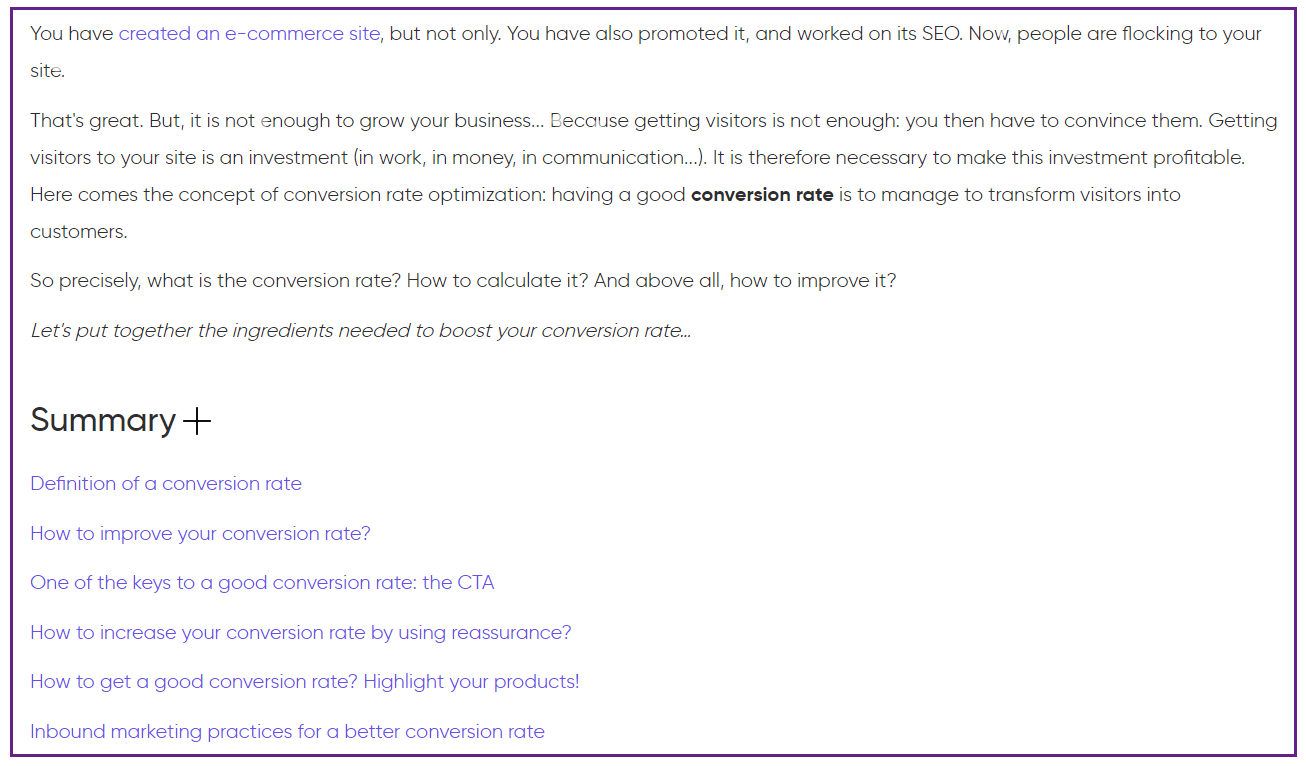How does it work? How to improve it? You will know everything about Page Rank.
What is Page Rank?
The Page Rank (PR) is a rating system, ranging from 1 to 10, established by Larry Page (co-founder of Google). This system is used to determine the quality and reputation of your site (whether you have created a one-page site, a multipage website or a blog).
When you create your site, the higher your PageRank, the higher your chances of being ranked on the first page of Google. PageRank is an important criterion to take into account in an SEO strategy.
You have just published an article, and you want it to gain popularity and be ranked higher in the SERPs. This article is on page B of this diagram.

To increase your page rank, you need to create links to page B on other pages with high popularity.
The links to page B are, on the diagram, marked by red arrows.
The pages A can be part of your website (pages A1 and A2): then they are called internal links.
If the links come from different domains (pages A3 and A4, in orange), they are external.
If you have to remember only one thing, it is this;
The higher the Page Rank of the page A, and the fewer outbound links a page has (in green on the diagram), the higher the PageRank of your page B will be.
Watch out
Do not confuse the
PR of a website and that of its pages. A website can be very popular, even if some of its pages do not have a high Page Rank.
The link juice principle
As we have seen, it is important to have many links, especially quality backlinks (or inbound links). The links must be relevant and add value. The quality of a backlink depends on two criteria:
-
The quality of the site that hosts the link and its PageRank,
-
The number of links contained in the site.
Hence, the concept of link juice:
In our diagram, page A3 has 7 outgoing links. So, the “juice” it gives is divided by 7. In other words, the popularity it provides, evaluated by the page rank, is divided by 7.
The greater the number of links, the less benefit you get.
So make sure you create a link network that takes into account the number of outgoing links from the pages, as well as their popularity and quality.
Are all the concepts in place?
Then we move on to the next step.
Since 2013, the value of your Page Rank is no longer public.
However, it is possible to estimate it with these tools:
Thanks to Moz, you can have an indication of the authority of your site with a score ranging from 1 to 100. The score is updated every month.
This tool is similar to Page Rank with the Domain Rating, a score from 0 to 100 that takes into account the number of links to your site and their quality. The higher you're rating, the harder it is to improve your score.
From its database, SEMRush calculates the SEMRushRank; This indicator is based on the keywords chosen, and the traffic generated.
It is not similar to Google's Page Rank, but it does give an indication about the position of a domain.
Unlike the previous indicators, Majestic relies mostly on the quality of the external and internal links to calculate the Trust Rank. In short, prefer a great quality link rather than several of lesser quality.
The exact algorithm used to calculate the page rank is secret, but these tools and indicators suggest ways to improve it.
Improve your Page Rank
To improve the Page Rank of page B, create many links that lead to this page...
... But how?
Net linking allows you to increase your PageRank.
But it must be natural! If you multiply links without taking care of the quality of backlinks, you risk being penalized by search engines: they can consider it as spam.
Internal links
A good internal linkage structure means having a clear site architecture for your website user experience, and for Google.
You must therefore make sure to create links between your different pages to transfer the popularity of a page to the other pages.
Yes: create links between your articles.
But in a smart way!
Here are some tips to optimize the effectiveness of your internal links:
To link to pages on your site, relate them to your content.
Link anchors should contain keywords that help your visitors and Google understand the structure of your pages. Try to match them with the titles of the pages they link to.

At the beginning of your article, you can create a summary by anchoring your content. You make your article more readable for Google, and more pleasant for your users.

This allows your visitors to stay longer on your website, and increase the visit time.
Thanks to Google Search Console, you can see your internal linking structure and improve it.
External links
In order to improve your page rank, you should also create external links. These links come from other domains that point to a page on your website – orange pages (A3 and A4) of the diagram.
You must also be careful when choosing your external links. If they are not of good quality, or if the pages have too many outbound links, they will not improve your page rank.
The best way to get natural external links is to focus on the quality of your content. If your content is good, and updated regularly, it will be cited by other sites.
To create external links, you can also use the method of link baiting.
Link Baiting means creating content that encourages sharing and creating links to it. This can be:
-
articles based on humour,
-
scoops,
-
interviews with personalities,
-
publications of studies,
-
computer graphics,
-
translations of articles, etc.
If visitors want to share your content, you get external links.
Finally, be present on the internet.
For this, you can do guest blogging and write an article on another blog or site, positioning yourself as an expert on a particular topic that you really care about (and that correlates with your industry or your website topic).
You can also participate in forums. Once again, participation should be useful: it should add value to the quality of discussion and be relevant.
Reciprocal links
A reciprocal link is a link between two sites that have been created and link to each other.
It is advisable to observe the same rigour and caution with reciprocal links as with inbound links. Because in the same way, search engines will study the popularity and quality of the site that contains the link, but also the relevance of the links and the quality of the destination pages.
You and your partners should make sure the topic is relevant, and you should also check the reputation and popularity of the websites you collaborate with. They should not be fraudulent and should not have too many outbound links, which is considered as suspicious by Google.
In general, outbound links should serve your audience, not your reputation. They must be informative and add value to your website.
Mistakes not to make
You now know the rules to follow to improve the page rank of your website.
And the traps to avoid?
Increased attention to the quality of links is essential, but take care of these pitfalls:
-
Be careful if you have several sites, and you have created links between them: search engines are suspicious of reciprocal links created from the same device or IP.
-
Be careful with your anchors: While link anchors are necessary to build good links, they can be detrimental if not used correctly. If you use the same anchor text repeatedly, you can lose readability and understanding.
-
Limit outbound links on your website: Google is unclear about the ideal number of links on a page. The figure of 100 appears in most studies, but it depends on the site type. For an online store, the number of internal and external links on a page will be much higher than 100. Do not hesitate to organize your pages in silos, that is to say categories of pages concerning similar or related topics, to organize your links and enhance your pages!
Opinions are mixed on the use of the no follow tag. It prevents from adding too many external links, the no follow tag prevents the juice from being passed to other websites that you link to from your site. Page Rank Sculpting, that is to say adding no follow tags, makes you lose popularity.
On the other hand, make sure that your internal links are not in no follow; otherwise your net linking won't be optimal!
Now you know some tips on how to improve your PageRank. However, keep in mind that improving your Page Rank is necessary, but not sufficient! You need to combine them with other methods to improve your SEO.
To go further
Take a look at our article on the 10 SEO mistakes that kill your website rankings. 🔫
It's up to you to make a difference!




